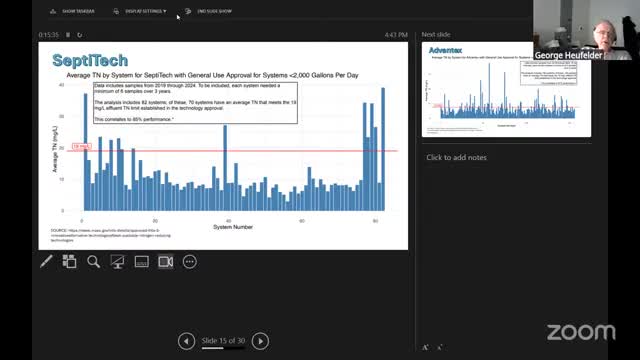Experts Discuss Nitrogen and PFAS Challenges in Wastewater Treatment Innovations
January 03, 2025 | Nantucket County, Massachusetts
This article was created by AI summarizing key points discussed. AI makes mistakes, so for full details and context, please refer to the video of the full meeting. Please report any errors so we can fix them. Report an error »

The Nantucket Board of Health convened on July 17, 2025, to discuss critical issues surrounding wastewater management and emerging contaminants, particularly nitrogen and PFAS (per- and polyfluoroalkyl substances). The meeting focused on the effectiveness of various nitrogen-reducing technologies and the broader implications of wastewater treatment on public health.
The session began with a presentation on the best available nitrogen technologies, highlighting systems like Advantex and Nitrex. Advantex reportedly achieves a performance level of 19 milligrams per liter of nitrogen, while Nitrex claims a 100% performance at a more stringent 10 milligrams per liter. The discussion emphasized the importance of these technologies in mitigating nitrogen pollution, especially when considering variances that allow deviations from health regulations. Board members were reminded that granting such variances necessitates a reciprocal commitment to public health, often through the implementation of advanced septic systems that better treat nitrogen and pathogens.
The conversation then shifted to the challenges posed by PFAS, which are increasingly recognized as contaminants of emerging concern. The board noted that PFAS are pervasive in various products, including personal care items and firefighting foams. The meeting underscored the difficulty in treating PFAS within wastewater systems, as current technologies are not equipped to effectively remove these substances. The board discussed recent findings indicating that while raw wastewater may contain low levels of PFAS, treatment processes can increase the detectability of these compounds, complicating the assessment of treatment efficacy.
The board also highlighted the regulatory landscape surrounding PFAS, noting that some states, like Maine, have restricted the use of wastewater sludge for land application due to contamination concerns. The only current disposal option for PFAS-laden sludge in Massachusetts is incineration, which raises further environmental and logistical challenges.
In conclusion, the Nantucket Board of Health's meeting addressed significant public health concerns related to wastewater management. The discussions on nitrogen reduction technologies and the pervasive issue of PFAS contamination reflect ongoing efforts to safeguard community health while navigating the complexities of environmental regulations and treatment capabilities. The board plans to continue exploring effective solutions and policies to mitigate these pressing issues in future meetings.
The session began with a presentation on the best available nitrogen technologies, highlighting systems like Advantex and Nitrex. Advantex reportedly achieves a performance level of 19 milligrams per liter of nitrogen, while Nitrex claims a 100% performance at a more stringent 10 milligrams per liter. The discussion emphasized the importance of these technologies in mitigating nitrogen pollution, especially when considering variances that allow deviations from health regulations. Board members were reminded that granting such variances necessitates a reciprocal commitment to public health, often through the implementation of advanced septic systems that better treat nitrogen and pathogens.
The conversation then shifted to the challenges posed by PFAS, which are increasingly recognized as contaminants of emerging concern. The board noted that PFAS are pervasive in various products, including personal care items and firefighting foams. The meeting underscored the difficulty in treating PFAS within wastewater systems, as current technologies are not equipped to effectively remove these substances. The board discussed recent findings indicating that while raw wastewater may contain low levels of PFAS, treatment processes can increase the detectability of these compounds, complicating the assessment of treatment efficacy.
The board also highlighted the regulatory landscape surrounding PFAS, noting that some states, like Maine, have restricted the use of wastewater sludge for land application due to contamination concerns. The only current disposal option for PFAS-laden sludge in Massachusetts is incineration, which raises further environmental and logistical challenges.
In conclusion, the Nantucket Board of Health's meeting addressed significant public health concerns related to wastewater management. The discussions on nitrogen reduction technologies and the pervasive issue of PFAS contamination reflect ongoing efforts to safeguard community health while navigating the complexities of environmental regulations and treatment capabilities. The board plans to continue exploring effective solutions and policies to mitigate these pressing issues in future meetings.
View full meeting
This article is based on a recent meeting—watch the full video and explore the complete transcript for deeper insights into the discussion.
View full meeting
